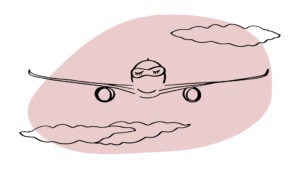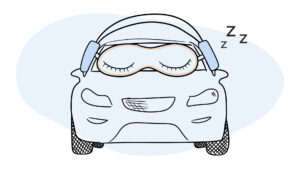Sleep Tips for Traveling
Disclosure: By clicking on the product links in this article, Mattress Nerd may receive a commission fee at no cost to you, the reader. Read full disclosure statement.
Between the unfamiliar beds, disrupted routines, and the stress of making sure you get where you need to be, getting a good night’s sleep can be difficult when you’re traveling. Fortunately, planning ahead and being prepared for what’s to come can make a big difference. Read on for five helpful sleep tips for traveling.
Bottom Line: How Can You Sleep Better While Traveling?
It’s normal to have trouble sleeping while you travel, but planning ahead, properly preparing for your trip and prioritizing healthy habits may help. Avoid over-scheduling your day, especially early in your trip, and do your best to follow your usual bedtime routine as much as possible.
5 Tips for Sleeping Better While Traveling
Plan Ahead to Minimize Pre-Travel Anxiety
Giving yourself plenty of time to prepare a travel itinerary, gather necessary documents, pack, and get to the airport or train depot can help minimize anxiety. It’s normal to feel a little anxiety about traveling, but if you feel rushed, you may forget something important, which only adds to your stress levels and can be disruptive to sleep. Do your best to minimize pre-travel stress by planning ahead. It may be helpful to make a checklist of everything you’ll need to bring or do. That way, you can feel confident that you’re fully prepared.
Follow Best Practices for the Best Chance of In-Travel Sleep
If you’re hoping to spend some of your travel hours asleep, plan for that outcome. Dress comfortably and in layers, so you can stay warm or strip down if you get too hot. Headphones or earplugs can help you block out ambient noise in favor of something relaxing, and a sleep mask will minimize light for a better chance of sleep. A travel pillow is also a good idea. It can help ensure your head and neck stay supported while you snooze.
Don’t Over-Schedule the Beginning of Your Trip
You may be excited about packing in as much as possible during your trip, but try to avoid over-scheduling yourself, especially at the beginning. You need a good night’s sleep to recover from travel time, and you’ll have more energy and generally feel better if you budget plenty of time for that. Trying to do too much can be overstimulating, which may make it harder to fall and stay asleep.
Follow Healthy Habits
While indulging is a nice treat when you’re traveling, you’ll likely feel better if you prioritize healthy habits as well. Remember to drink plenty of water, eat a balanced diet, and enjoy alcohol and caffeine in moderation. Eating richer foods or drinking more than usual can both negatively affect your sleep patterns. You may not be following your regular exercise routine, but you should also make a point of getting some kind of daily movement. Regular exercise is key for healthy sleep.
Do Your Best To Follow Your Usual Bedtime Routine
If you have a regular bedtime routine that helps you wind down for sleep, do your best to replicate it as much as possible. The familiarity of the routine itself can be a signal to your body that it’s time to start relaxing in preparation for bed, even in unfamiliar surroundings.
Common Travel-Related Sleeping Issues
There can be a few reasons you’re experiencing travel-related sleeping issues. Here’s what’s going on, and what you can do to adjust or avoid the situation entirely.
- Jet lag. This short-term sleep disorder is common after long-distance travel across three or more time zones. You may be hop-scotching across time zones, but your circadian rhythm is still synched to your hometown time. That can leave you feeling disoriented and groggy. If you know you’ll be traveling to a different time zone, spend a few days before your trip moving your bedtime forward (or back, whichever is appropriate given your destination) by one hour. Add another hour the second day, and a third hour on the third day. Typically, it takes one day per time zone for the body to adjust, and spending some time adjusting your sleep schedule before your trip can help ease the transition.
- Changes to your regular schedule. If you stick to a regular bedtime, it can be affected by travel, which may lead to sleep issues. You may find it difficult to fall or stay asleep. Do your best to stick to a regular bedtime, and resist the temptation to jam your schedule full of activities that cut into necessary sleep time.
- Travel-related fatigue. It’s not uncommon to experience anxiety before and even during a trip, thanks to a combination of nerves, motion sickness, layovers and travel delays, physical discomfort, and other issues. Planning ahead, embracing best practices for sleeping during travel, and packing appropriate travel accessories can all help you navigate the stressors of the journey.
- Unfamiliar sleep surroundings. If you don’t sleep well in a new environment, you aren’t alone. Researchers dub it the “first-night effect,” a phenomenon in which people experience sleep disruptions on the first night in a new sleep setting, which then tend to disappear on subsequent nights. Do your best to follow your usual bedtime routine, and remember that the first-night effect usually only lasts one night! It can also be helpful to pack your pillow from home if you have the space.
Frequently Asked Questions
How can I sleep better while traveling?
What you do during the day can set you up for a good night’s sleep, so do your best to stay hydrated, limit caffeine and alcohol, eat nourishing meals, and get in a little movement. At night, follow your usual bedtime routine as much as possible. Plan ahead to ensure you’re as comfortable as possible, with appropriate travel accessories that make it easy to get comfortable while you travel.
Why is it hard to sleep while traveling?
There are likely a combination of factors at play. Disruptions to your usual sleep schedule, travel-related stress and anxiety, jet lag, and unfamiliar sleep surroundings can all make it difficult to get a good night’s sleep.
How to sleep with travel anxiety?
The best way to deal with travel anxiety is to plan ahead and prepare as much as possible before your trip. By ensuring you’re comfortable, with appropriate travel accessories, you may find that your anxiety lessens.
Takeaway
Feeling well-rested while you travel can be difficult, but it doesn’t have to be impossible. Whether you’re traveling for work or pleasure, planning ahead is the best way of setting yourself up for success. That includes packing appropriately, following healthy habits, avoiding front-loading the beginning of your trip, and sticking to your bedtime routine as much as possible.
Source List
- Blasche, G. et al. (2012). Travel‐Related Change of Residence Leads to a Transitory Stress Reaction in Humans. https://academic.oup.com/jtm/article/19/4/243/1815906?login=false
- Kline, C. (2014). The bidirectional relationship between exercise and sleep: Implications for exercise adherence and sleep improvement. https://pubmed.ncbi.nlm.nih.gov/25729341/


